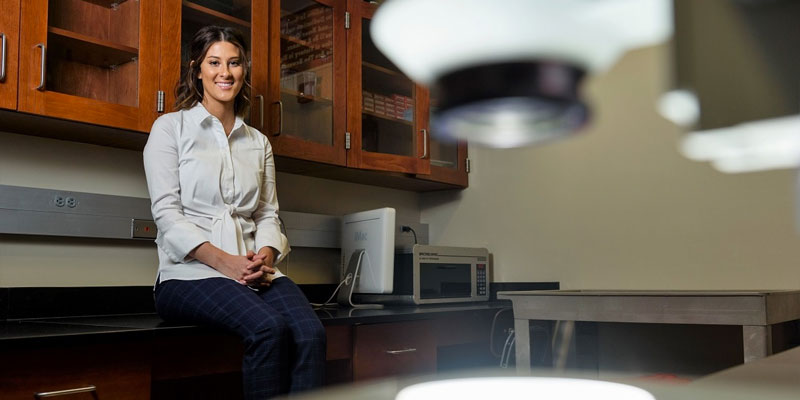People have a reasonable expectation when visiting a physician: a diagnosis.
Then, there’s a prognosis and, hopefully, a plan for recovery.
Two years passed before University of Alabama student Chloe West learned why she’d been experiencing chronic fatigue and foggy brain: dysautonomia, a condition in which the nervous system doesn’t function properly. West was later diagnosed with postural orthostatic tachycardia syndrome (POTS), a disease that features dysautonomia and can cause rapid fluctuations of heart rate.
West’s diagnosis was equal parts relief and frustration.
“I was disappointed that there wasn’t a cure,” West said. “My dad (a family medicine doctor) was ultimately the one that diagnosed me, but he didn’t know what it was. A lot of doctors don’t know what it is.”
West’s condition nixed her childhood dream of being in the FBI, but it provided a new motivation to help fill the void in doctors understanding and treating POTS, and to improve the lives of those living with it. Having graduated with a psychology degree from UA on Saturday, West will begin graduate school at Georgia State University, where she will pursue a doctoral degree in neuroscience and research the causes of POTS. West was also awarded the Second Century Initiative Neuroinflammation and Cardiometabolic Disease Fellowship at GSU.
“POTS is definitely the reason I’m going into neuroscience and a huge determinate in the path I’m taking in life,” West said. “It’s given me a sense of purpose within my diagnosis, and the idea that I can help so many people with this illness drives me every day to learn more about it.”
Early signs
West first began experiencing symptoms of POTS during her freshman year at the University of Georgia. She was “sick all the time,” and she initially attributed the symptoms to depression and anxiety, since symptoms of both anxiety and POTS affect the same hormones and body systems.
West transferred to UA after her freshman year to be closer to her parents; her father, Todd, is medical director of the UA Student Health Center. West then began a strict sleep, medication, diet and exercise plan to help regulate her symptoms and condition her heart.
The last sixth months have been “smooth sailing,” but through numerous support groups and meeting other people on campus who have POTS, West has learned that she’s fortunate to have found her balance.
“It’s definitely been a fear that my symptoms will get out of control at some point in my life,” West said. “But I also see a lot of stories of women – it’s more common in women – who’ve found that perfect regimen and have been able to condition themselves out of it.
“I believe that POTS is caused by epigenetic effects, so it’s something in your life, something above your genome that’s causing this illness to be expressed, and people have found ways to reverse that.”
Affirmation
West added a biology minor prior to beginning her senior year at UA and began researching POTS in hopes of strengthening her resume for graduate programs in psychology and neuroscience. She said she’ll soon begin working with Dr. Javier Stern, a neuroscience researcher at GSU, to study the effects of homeostasis in lowering heart rate and blood pressure.
West credits UA biology professor Dr. Kim Caldwell and psychology professor Dr. Thomas B. Ward with guiding her in her POTS research over the last year.
“In talking to some women who are experts in this field – one at Columbia and one at the University of Washington – I presented them with my hypothesis,” West said. “And to hear them say, ‘you might be on to something … this is good, and you need to get funding for this research,’ that was a huge relief and motivator.
“I want people with POTS to know they’re not alone, and the strength to fight this illness is within them. It’s becoming more and more common, and as doctors learn more about it, more people will be diagnosed.”
This story originally appeared on the University of Alabama’s website.
(Courtesy of Alabama NewsCenter)













